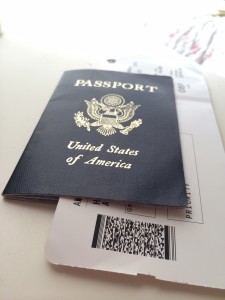 A few years ago I started putting together all of my suggestions for planning an international business trip. There were a lot of topics, including passport and visa requirements, vaccinations, credit cards, safety, packing, time changes, culture shock, and more.
A few years ago I started putting together all of my suggestions for planning an international business trip. There were a lot of topics, including passport and visa requirements, vaccinations, credit cards, safety, packing, time changes, culture shock, and more.
I’m in the middle of prepping for another big international trip, and reading through these posts has been incredibly helpful. So I’m updating them and putting them back up here, and hopefully they’ll make someone else’s next big trip a little easier.
When I found out that I would be taking my first international business trip I was both excited and nervous. I was excited to go to a place I had never been before (Manila), plus excited about all the points I would be racking up. I was nervous about all the questions I didn’t have answers to. How would I deal with language barriers to get to my destination? Do I need to have vaccinations? What should I wear? And the list goes on. (Interestingly, even now that I’ve been on dozens of international trips I still get nervous, and checklists still help so much!)
Here is a list of some things you should plan for about 4-8 weeks before your international trip.
Passport (ASAP, at least 6-8 weeks prior). First and foremost, make sure you have a passport. If you don’t have one you need to act quickly as it takes 4-6 weeks to get your passport using the normal route, and you may need even more time if your destination requires a visa. In fact, even if you don’t have an international trip in your immediate future you may consider getting a passport. It will save you a lot of headaches down the line, and since they last 10 years you won’t have to renew it any time soon. If you have an international business trip come up and you need it faster there are ways to expedite the process but be prepared to pay fees. Check to see if your company will reimburse you for the expense—many companies do (mine did).
If you have a passport already and haven’t traveled in a while check the expiration date. They last 10 years for adults, but time seems to fly by sometimes and the expiration may sneak up on you. Many countries won’t allow you to visit if your passport expires even six months after your trip. For my trip to India a few years ago my trip got pushed out by ten days, which meant I missed the six month cutoff by a few days. I had to order my replacement on priority rush, which was *stressful*.
Finally, be sure you add your passport to your packing list! It sounds like a no-brainer, but I kid you not I have forgotten it before. Just write it down!
You should be able to get answers to many questions you may have on the U.S. State Department website site, which is surprisingly helpful and easy to use.
Note: If you are driving to Canada or Mexico for business and don’t plan to fly internationally you should consider just getting a U.S. Passport card. It’s cheaper and will fit in your wallet like a drivers license.
Global entry (ASAP, 8-10 weeks prior). I’ve talked about Global Entry a lot, and in my experience it deserves every bit of praise it gets. For $100, you get five years of going through a kiosk for customs vs. waiting in the long lines. You also get five years of TSA Pre-check. Even if you only fly internationally once a year I think this is worth it. For those of you that go overseas often it is a must have.
Credit card applications (8-10 weeks prior). There are a number of things to consider with methods of payment in foreign countries. If your usual credit card charges foreign transaction fees consider applying for a new card before your trip. Here is a list of good cards without foreign transaction fees from The Points Guy.
Visas (6-8 weeks prior). Make sure you take care of any work visas you need BEFORE you leave. Your company travel department should be able to help you determine what documents you need and how to get them. If you don’t have a travel department check the US Department of State website which will tell you need for any country you travel to.
Keep in mind the visa process can be painful and each country can have different requirements. For example, for India I need a letter from my manager, a letter from the manager of the office I’m visiting (with *very*) specific requirements, a lengthy application, a number of different forms of ID, special photos, and a hefty fee. There are companies that can help walk you through this process and I highly recommend using them. I have used CIBT and had a very good experience overall.
Vaccinations (4-6 weeks prior). The Centers for Disease Control recommends you have routine vaccines regardless of whether you travel or not, and they have a handy tool to see what additional vaccines you may need depending on location. It’s recommended you visit your doctor to discuss your travel about 4-6 weeks ahead of your trip so that your vaccines will work, and because some vaccines require more than one dose. Your doctor may have additional recommendations.
Readers, anything else on your list for 4-8 weeks before an international trip?
****************************************************************************
Be sure to check out my page with products I recommend for travel!
Have a travel question or suggestion? Send it to RW @RoadWarriorette.com.
Follow Road Warriorette on Twitter, Facebook, and Pinterest!
This post may include affiliate links. That means if you click on something and make a purchase I may make a few cents. Thanks for your support!




Adapters for the destination country – and also the transit country!
Small gifts for colleagues/hosts especially of your hometown or of the US. I like to bring candy if I’m going to an event or meeting with a larger group.
Small bills for tipping.
Compression socks, travel pillow, the usual long-haul flight accessories.
Items that may be harder to find or more expensive, like tampons.
You should also let the American Embassy in the countries you are traveling to know when you will be in the country.
I’d add that the week before my work trips I try on the outfits I am taking to make sure a) they fit; b) they don’t have any torn hems or issues from my last trip I forgot about, and c) they go together the way I imagined in my head. Just one time realizing a hem was ruined the night before a trip and scrambling to find a back up suit at the last minute was enough for me! It can be hard to find something suitable (pun intended) in foreign countries.